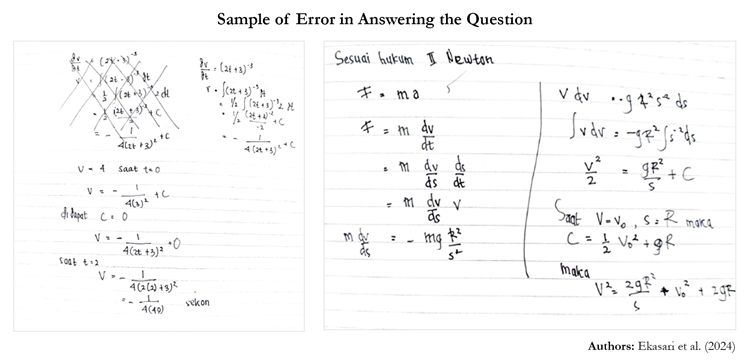
Error Analysis of Learners’ Problem-Solving Abilities in Mathematics Courses: A Newman Error Analysis (NEA) Approach
Abstract
This study endeavors to systematically discern the spectrum of learner errors manifesting in problem-solving processes within the domain of mathematics, specifically focusing on the intricacies of integration, utilizing Newman Error Analysis (NEA) as the guiding framework. The cohort under investigation comprises 14 first-year students hailing from the Department of Physics Education at Musamus University, Merauke. Employing a descriptive methodology underscored by a qualitative orientation, this research incorporates tests and interviews as primary instruments for data collection. The tests are designed to meticulously evaluate the array of errors committed by learners, as per the tenets of Newman’s model. Additionally, a subset of four participants is selected for in-depth interviews aimed at elucidating the underlying challenges encountered during problem-solving endeavors, which ultimately contribute to the genesis of learner errors. Analysis of the findings underscores the prevalence of comprehension errors, transformation errors, process errors, and encoding errors amongst learners grappling with problems centered on the subtopic of integration.
Keywords
Full Text:
PDFReferences
Ayebo, A., Ukkelberg, S., & Assuah, C. (2017). Success in introductory calculus: The role of high school and pre-calculus preparation. International Journal of Research in Education and Science, 3(1), 11–19. https://doi.org/10.21890/ijres.267359
Boz, B., & Adnan, M. (2017). How do freshman engineering students reflect an online calculus course?. International Journal of Education in Mathematics, Science and Technology, 5(4), 262–278. https://doi.org/10.18404/ijemst.83046
Bressoud, D. M. (1992). Why do we teach calculus?. The American Mathematical Monthly, 99(7), 615–617. https://doi.org/10.1080/00029890.1992.11995901
Dawkins, P. C., & Epperson, J. A. M. (2014). The development and nature of problem-solving among first-semester calculus students. International Journal of Mathematical Education in Science and Technology, 45(6), 839–862. https://doi.org/10.1080/0020739X.2014.884645
Ellis, B., Larsen, S., Voigt, M., & Vroom, K. (2021). Where calculus and engineering converge: an analysis of curricular change in calculus for engineers. International Journal of Research in Undergraduate Mathematics Education, 7, 379–399. https://doi.org/10.1007/s40753-020-00130-9
Güner, P., & Erbay, H. N. (2021). Prospective mathematics teachers’ thinking styles and problem-solving skills. Thinking Skills and Creativity, 40, 100827. https://doi.org/10.1016/j.tsc.2021.100827
Ningrum, Y., Kusmayadi, T. A., & Fitriana, L. (2019). Analysis problem solving about contextual problem of algebraic in junior high school. Journal of Physics: Conference Series, 1211(1), 012102. https://doi.org/10.1088/1742-6596/1211/1/012102
Nuryati, N., Purwaningsih, S. S., & Habinuddin, E. (2022). Analysis of errors in solving mathematical literacy analysis problems using newman. International Journal of Trends in Mathematics Education Research, 5(3), 299–305. https://doi.org/10.33122/ijtmer.v5i3.164
Rasmussen, C., Marrongelle, K., & Borba, M. C. (2014). Research on calculus: What do we know and where do we need to go?. ZDM, 46, 507–515. https://doi.org/10.1007/s11858-014-0615-x
Rohmah, M., & Sutiarso, S. (2018). Analysis problem solving in mathematical using theory Newman. Eurasia Journal of Mathematics, Science and Technology Education, 14(2), 671–681. https://doi.org/10.12973/ejmste/80630
Schukajlow, S., Blomberg, J., Rellensmann, J., & Leopold, C. (2022). The role of strategy-based motivation in mathematical problem solving: The case of learner-generated drawings. Learning and Instruction, 80, 101561. https://doi.org/10.1016/j.learninstruc.2021.101561
Siskawati, E., Zaenuri, Z., & Wardono, W. (2021). Analysis of students’ error in solving math problem-solving problem based on newman error analysis (NEA). Journal of Physics: Conference Series, 1918(4), 042108. https://doi.org/10.1088/1742-6596/1918/4/042108
Son, A. L., Darhim, D., & Fatimah, S. (2019). An analysis to student error of algebraic problem solving based on polya and newman theory. Journal of Physics: Conference Series, 1315(1), 012069. https://doi.org/10.1088/1742-6596/1315/1/012069
Sukoriyanto, S. (2020). Students’ errors analysis in solving the geometry word problem based on newman stage. AIP Conference Proceedings, 2215(1), 060028. https://doi.org/10.1063/5.0000490
Sumule, U., Amin, S. M., & Fuad, Y. (2018). Error analysis of Indonesian junior high school student in solving space and shape content PISA problem using newman procedure. Journal of Physics: Conference Series, 947(1), 012053. https://doi.org/10.1088/1742-6596/947/1/012053
Suradi, S., & Djam’an, N. (2021). Students’ error on proof of the group with “satisfy axioms proof” based on newman error analysis. Journal of Physics: Conference Series, 2123(1), 012024. https://doi.org/10.1088/1742-6596/2123/1/012024
Tasman, F., & Ahmad, D. (2018). Visualizing volume to help students understand the disk method on calculus integral course. IOP Conference Series: Materials Science and Engineering, 335(1), 012112. https://doi.org/10.1088/1757-899X/335/1/012112
Utami, D. R., Nusantara, T., & Qohar, A. (2021). Analisis kesulitan siswa pada aspek kognitif dalam menyelesaikan soal persamaan kuadrat berdasarkan kesalahan newman. Jurnal Pendidikan: Teori, Penelitian, dan Pengembangan, 6(12), 1853–1860. https://doi.org/10.17977/jptpp.v6i12.15159
Yunus, J., Zaura, B., & Yuhasriati, Y. (2019). Analysis of students error according to newman in solving mathematics problems of algebra in the form of story in second grade of SMPN 1 Banda Aceh. Jurnal Geuthèë: Penelitian Multidisiplin, 2(2), 308–313. https://doi.org/10.52626/jg.v2i2.63
Zakaria, E., & Salleh, T. S. (2015). Using technology in learning integral calculus. Mediterranean Journal of Social Sciences, 6(5), 144–148. https://doi.org/10.5901/mjss.2015.v6n5s1p144
Jurnal Pendidikan Sains Journal of Science Education Graduate School of Universitas Negeri Malang, Indonesia JPS is licensed under Creative Commons Attribution-ShareAlike 4.0 International License |







